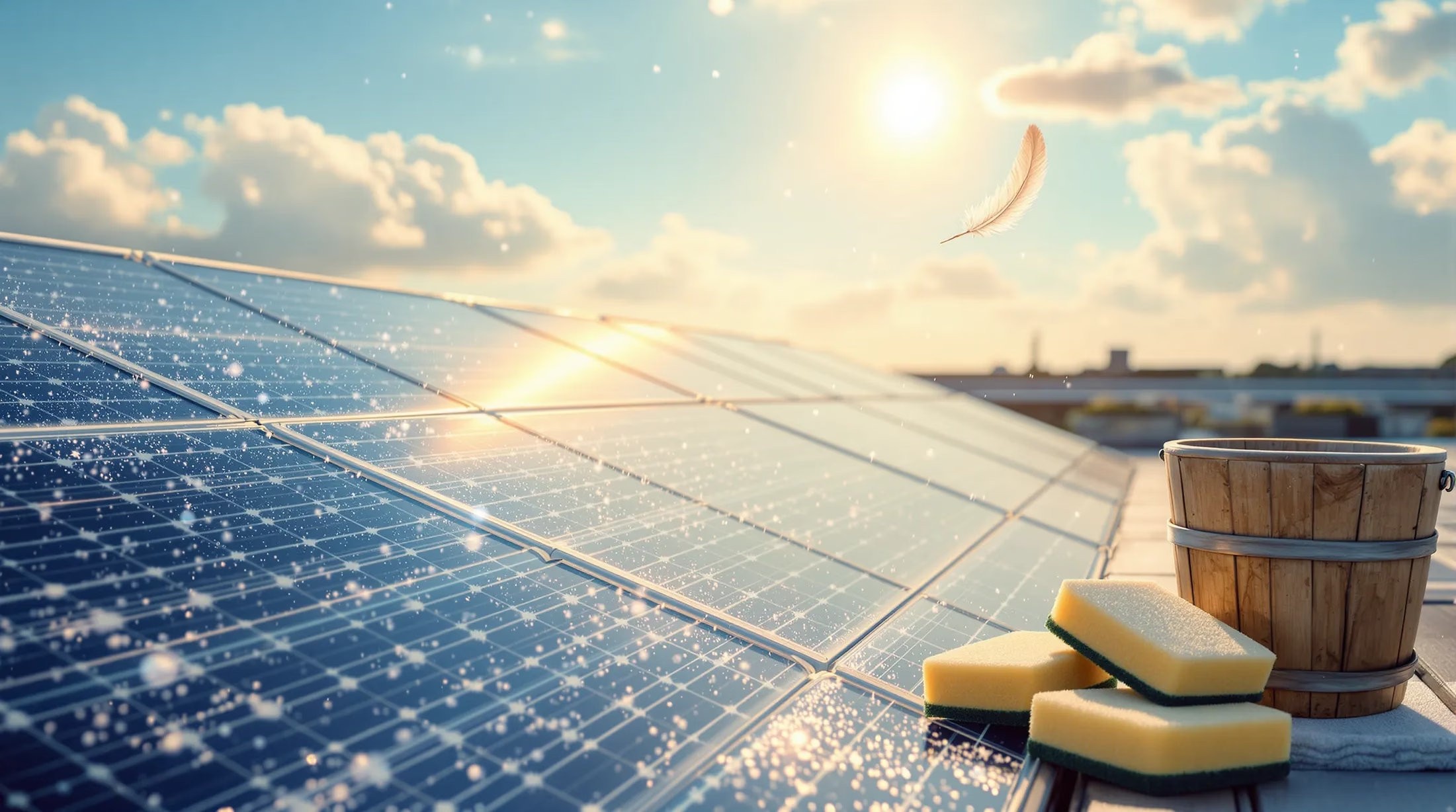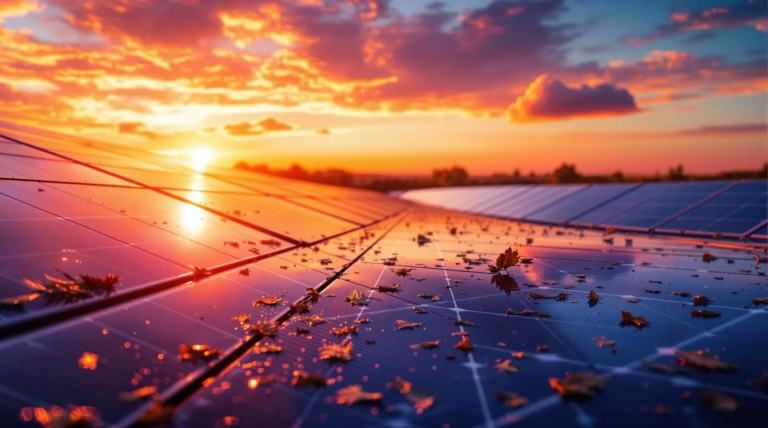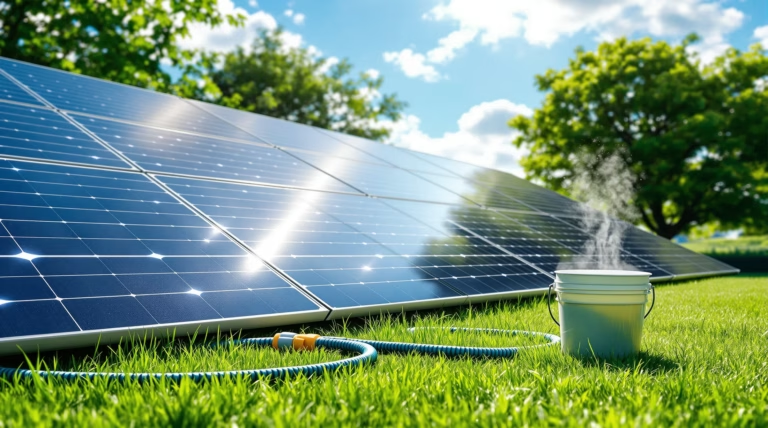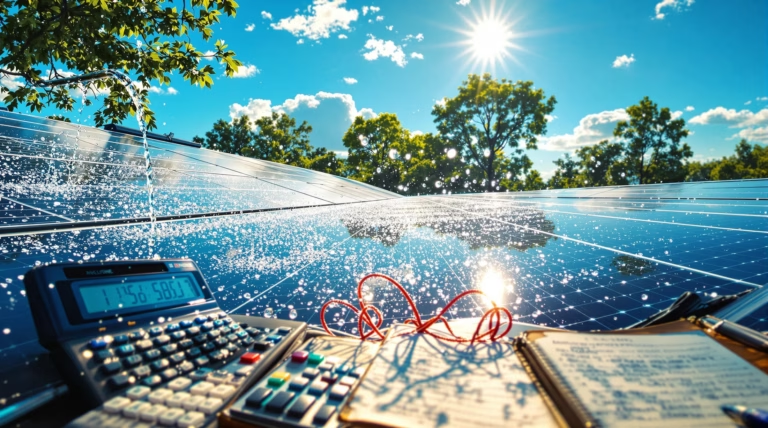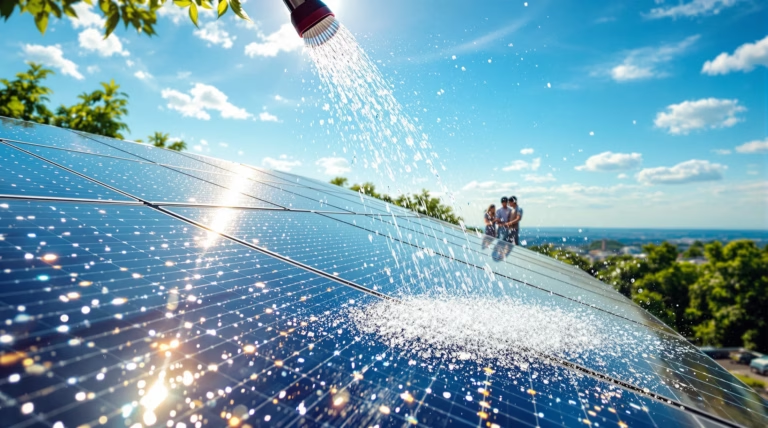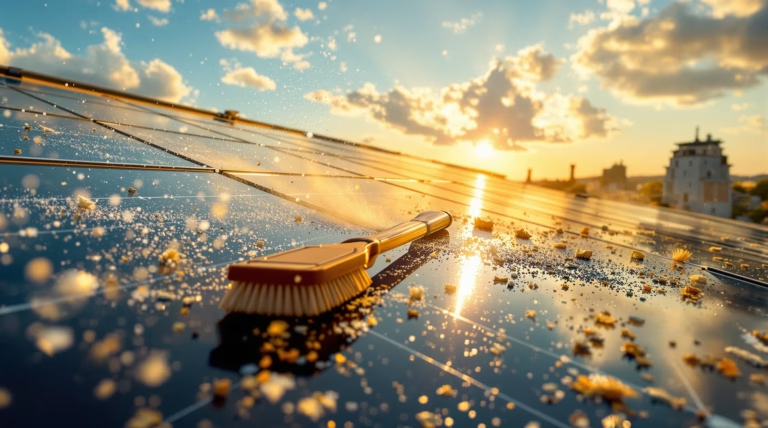What to Clean Solar Panels With: Best Solutions and Tips
Maximize your solar energy investment by maintaining clean and efficient solar panels. Proper cleaning not only enhances performance but can also extend the lifespan of your solar system. Let’s explore the most effective cleaning solutions and methods to keep your panels operating at peak efficiency.
Why Cleaning Solar Panels is Essential
Solar panels represent a significant investment in sustainable energy, but their performance can be drastically compromised without proper maintenance. Over time, various contaminants accumulate on your panels, creating a barrier that prevents optimal sunlight absorption. Here’s what affects your panels:
- Dust and dirt accumulation
- Pollen deposits
- Bird droppings
- Tree sap and leaves
- Industrial pollution
These contaminants can reduce energy production by up to 30%, leading to increased utility bills and potential long-term damage to the panels’ surface.
Impact of Dirt and Debris on Solar Panel Efficiency
| Contamination Level | Efficiency Loss |
|---|---|
| Light dust layer | 5% |
| Normal conditions | 15-25% |
| Heavy contamination | 30% or higher |
Real-world examples show energy production increases of 20-25% after thorough cleaning, particularly in systems that have been neglected for extended periods.
Frequency of Cleaning Solar Panels
The optimal cleaning schedule depends on your local environment and weather conditions. Here’s a general guideline:
- Standard environments – 2-4 times per year
- High pollution areas – every 1-2 months
- Spring – remove pollen buildup
- Autumn – address fallen leaves and debris
- Summer (dry regions) – additional mid-season cleaning
Best Solutions for Cleaning Solar Panels
Choose appropriate cleaning solutions that effectively remove dirt without damaging the panels’ delicate surface. Recommended options include:
- Water with mild dish soap (3% concentration)
- Specialized solar panel cleaners
- Vinegar solution (1:8 ratio with water)
- Deionized water for spot-free results
Eco-Friendly Cleaning Solutions
Maintain your commitment to environmental sustainability with these green cleaning approaches:
- Biodegradable dish soap and water mixture
- White vinegar and water solution (1:8 ratio)
- Collected rainwater for cleaning
- Natural rainfall pre-cleaning method
DIY Cleaning Methods
Follow these steps for effective DIY solar panel cleaning:
- Choose early morning or evening hours when panels are cool
- Rinse panels with a garden hose to remove loose debris
- Apply gentle cleaning solution with a soft microfiber cloth or sponge
- Address stubborn spots by allowing solution to soak briefly
- Rinse thoroughly to prevent soap residue
- Use a squeegee to prevent water spots
Professional Cleaning Services
Professional solar panel cleaning services offer expertise and specialized equipment for optimal maintenance. These specialists utilize advanced tools including purified water systems that prevent residue, extension tools for high-mounted panels, and soft brushes designed specifically for solar panel surfaces. Their comprehensive insurance coverage and technical knowledge ensure safe handling of your system’s components during the cleaning process.
| Service Aspect | Benefits |
|---|---|
| Cost Range | $100-$300 per cleaning |
| Equipment | Specialized tools and purified water systems |
| Safety | Full insurance coverage and trained personnel |
| Additional Value | System inspection and issue identification |
Tips for Effective Solar Panel Cleaning
Ground-mounted systems and single-story rooftop panels can be maintained through both DIY methods and professional services. The most effective cleaning occurs during early morning or evening hours when panels are cool, preventing streak formation from rapid water evaporation. Always review your manufacturer’s guidelines before beginning any maintenance work.
Safety Precautions During Cleaning
- Never work alone when accessing roof-mounted panels
- Use proper safety harnesses and secure anchor points
- Wear non-slip footwear and protective gear
- Avoid cleaning during adverse weather conditions
- Consider professional services for high or steep installations
Tools and Equipment Needed
- Soft-bristle brush with extension handle
- Garden hose with spray nozzle
- Cleaning solution bucket
- Squeegee or lint-free cloth
- Mild dish soap (1/8 cup per 2 gallons of water)
- Telescopic cleaning tools for elevated panels
Common Mistakes to Avoid When Cleaning Solar Panels
Proper maintenance requires understanding potential pitfalls that could compromise your system’s efficiency. Common errors include using inappropriate cleaning methods, applying excessive pressure, and attempting maintenance in unsafe conditions.
Using Harsh Chemicals
Avoid using products containing ammonia, bleach, or abrasive compounds, as these can permanently damage the panels’ anti-reflective coating. Strong detergents often leave residue that attracts more dirt, creating a cycle of decreased efficiency. Stick to manufacturer-approved cleaning solutions to maintain warranty coverage and protect your investment.
Cleaning During Peak Sunlight
Cleaning solar panels during peak daylight hours poses significant risks to your solar energy system. When panels are exposed to intense sunlight, their surface temperatures can soar above 140°F (60°C). Applying cool water to these heated surfaces creates thermal shock, which can result in:
- Glass panel cracking
- Damaged edge seals
- Compromised panel integrity
- Accelerated deterioration of older systems
- Potential voiding of warranty coverage
The challenges extend beyond physical damage. When cleaning in hot conditions, rapid evaporation creates additional problems:
- Cleaning solution dries too quickly
- Stubborn water spots form
- Streaks develop on panel surfaces
- Reduced cleaning effectiveness
- Diminished panel performance
For optimal results and equipment safety, schedule cleaning during early morning hours. This timing provides sufficient natural light for thorough cleaning while ensuring panels remain cool enough for effective maintenance. The moderate temperature allows cleaning solutions to work properly and eliminates the risk of thermal shock damage to your investment.

